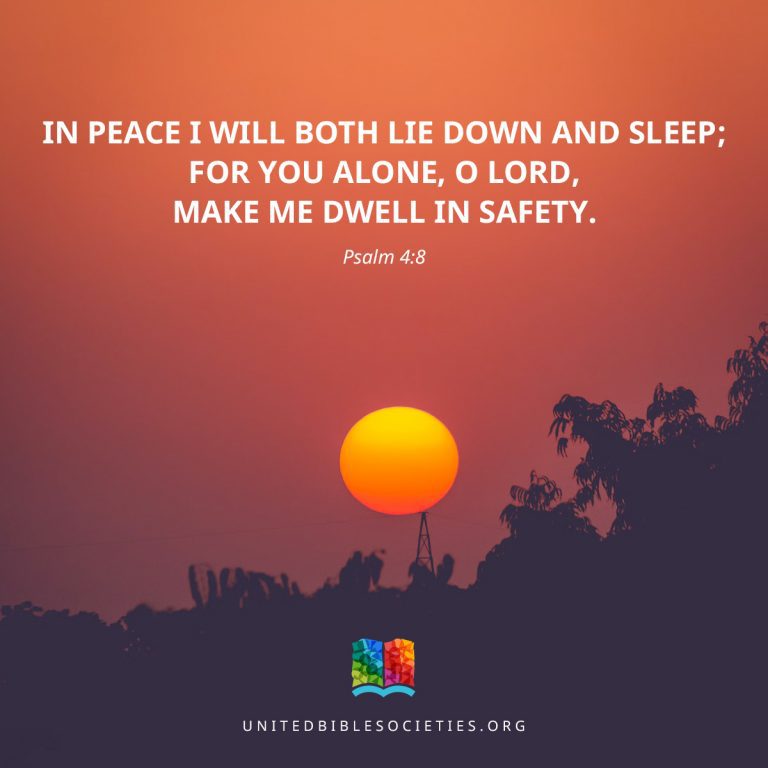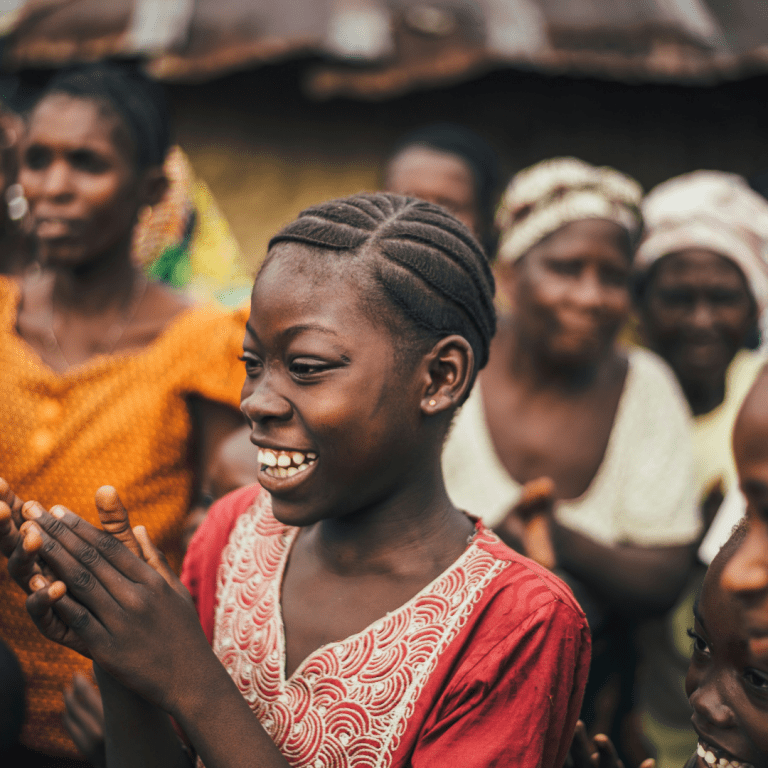God Speaks to Moses
1 One day, Moses was taking care of the sheep and goats of his father-in-law Jethro, the priest of Midian, and Moses decided to lead them across the desert to Sinai, the holy mountain. 2 There an angel of the Lord appeared to him from a burning bush. Moses saw that the bush was on fire, but it was not burning up. 3 “This is strange!” he said to himself. “I'll go over and see why the bush isn't burning up.”
4 When the Lord saw Moses coming near, he called him by name from the bush, and Moses answered, “Here I am.”
5 God replied, “Don't come any closer. Take off your sandals—the ground where you are standing is holy. 6 I am the God who was worshiped by your ancestors Abraham, Isaac, and Jacob.”
Moses was afraid to look at God, and so he hid his face.
7 The Lord said:
I have seen how my people are suffering as slaves in Egypt, and I have heard them beg for my help because of the way they are being mistreated. I feel sorry for them, 8 and I have come down to rescue them from the Egyptians.
I will bring my people out of Egypt into a country where there is a lot of good land, rich with milk and honey. I will give them the land where the Canaanites, Hittites, Amorites, Perizzites, Hivites, and Jebusites now live. 9 My people have begged for my help, and I have seen how cruel the Egyptians are to them. 10 Now go to the king! I am sending you to lead my people out of his country.
11 But Moses said, “Who am I to go to the king and lead your people out of Egypt?”
12 God replied, “I will be with you. And you will know that I am the one who sent you, when you worship me on this mountain after you have led my people out of Egypt.”
13 Moses answered, “I will tell the people of Israel that the God their ancestors worshiped has sent me to them. But what should I say, if they ask me your name?”
14-15 God said to Moses:
I am the eternal God. So tell them that the Lord, whose name is “I Am,” has sent you. This is my name forever, and it is the name that people must use from now on.
16 Call together the leaders of Israel and tell them that the God who was worshiped by Abraham, Isaac, and Jacob has appeared to you. Tell them I have seen how terribly they are being treated in Egypt, 17 and I promise to lead them out of their troubles. I will give them a land rich with milk and honey, where the Canaanites, Hittites, Amorites, Perizzites, Hivites, and Jebusites now live.
18 The leaders of Israel will listen to you. Then you must take them to the king of Egypt and say, “The Lord God of the Hebrews has appeared to us. Let us walk three days into the desert, where we can offer a sacrifice to him.” 19 But I know that the king of Egypt won't let you go unless something forces him to. 20 So I will use my mighty power to perform all kinds of miracles and strike down the Egyptians. Then the king will send you away.
21 After I punish the Egyptians, they will be so afraid of you that they will give you anything you want. You are my people, and I will let you take many things with you when you leave the land of Egypt. 22 Every Israelite woman will go to her Egyptian neighbors or to any Egyptian woman living with them and ask them for gold and silver jewelry and for their finest clothes. The Egyptians will give them to you, and you will put these fine things on your sons and daughters. Carry all this away when you leave Egypt.
Alla ye Musa kumandi
1 Saayiŋ, Musa ka a bitankewo Yetiro meŋ keta Midiyani piriisoo* ti, la saajiyolu niŋ baalu le kanta. A niŋ ì ka taa le fo keñewuloo* kara doo la, ka taa fo Horebu to, meŋ mu Alla la konkoo ti. 2 Jee to Yaawe* la malaayikoo fintita a kaŋ niŋ dimbaa la ka bo yirindiŋo bala. Musa ye a je ko, dimbaa ye yirindiŋo mala le, bari a maŋ a jani. 3 Wo to le Musa kumata ko, “M be taa le, ŋa taa ñiŋ kaawakuwo juubee, meŋ ye a tinna, ñiŋ yirindiŋo maŋ jani.”
4 Kabiriŋ Yaawe ye a je ko, a taata le ka a juubee, a ye a kumandi ka bo naŋ yirindiŋo kono, “Musa! Musa!” Aduŋ Musa ko, “M fele jaŋ.” 5 Alla ko, “Kana kata naŋ kotenke. I la samatoolu bondi, kaatu i be looriŋ dulaa meŋ to, dulaa senuŋo le mu.” 6 Bituŋ a ko, “Nte le mu i mumuñolu la Alla ti, Iburayima la Alla, Isiyaaka la Alla, aniŋ Yaakuba la Alla.” Biriŋ wo to, Musa ye a ñaadaa muuri, kaatu a silata le, ka Alla juubee.
7 Yaawe ko, “Ŋa n na moolu la bataa kuwo je le, ì be meŋ kono Misira. Ŋa ì kumboo kaŋo moyi le, kaatu ì la dookuu kuntiyolu le ye ì mantoora, ì la bataa ye n dewuŋ ne. 8 Saayiŋ n naata le, ka ì tankandi Misirankoolu bulu, aniŋ ka ì bondi wo bankoo kaŋ, ka ì samba banku warariŋ baa to, keekewo niŋ liyo ka woyi daameŋ, Kanaaninkoolu, Hitinkoolu, Amorinkoolu, Perisinkoolu, Hiwinkoolu aniŋ Yebusinkoolu be sabatiriŋ daameŋ. 9 Banisirayilankoolu la kumboo futata n na le saayiŋ, aduŋ ŋa a je le, Misirankoolu ka ì mantoora ñaameŋ. 10 Saayiŋ taa. M be i kii la Firawoona le kaŋ, fo i si n na moolu, Banisirayilankoolu, bondi naŋ Misira.”
11 Musa ko Alla ye ko, “Nte mu jumaa le ti, fo n si taa Firawoona yaa, ka Banisirayilankoolu bondi naŋ Misira?”
12 Bari Alla ko, “M be tara la i fee le. Ñiŋ ne be ke la i ye taamanseeroo ti ko, nte le ye i kii. Niŋ i ye moolu bondi naŋ Misira, ali be nte batu la ñiŋ konkoo le santo.”
Alla ye a too lankenemayandi Musa ye
13 Musa naata a jaabi ko, “Niŋ n taata Banisirayilankoolu yaa n ko, ‘Ali bonsuŋolu la Alla le ye n kii ali kaŋ’, ì be n ñininkaa la le, ‘A too ndii?’ Bituŋ m be muŋ ne fo la ì ye?”
14 Alla ko Musa ye ko, “M mu meŋ ti, m mu wo le ti. I be ñiŋ ne fo la Banisirayilankoolu ye, ‘M mu meŋ ti, wo le ye n kii ali kaŋ.’ ” 15 Alla ko Musa ye fanaa ko, “A fo Banisirayilankoolu ye ko, ‘Yaawe* ali mumuñolu la Alla, Iburayima la Alla, Isiyaaka la Alla, aniŋ Yaakuba la Alla le ye n kii ali kaŋ.’ Ñiŋ ne mu n too ti fo abadaa, too meŋ ali hakiloo ñanta bula la a la jamaani-wo-jamaani. 16 Taa, i ye taa Banisirayila alifaalu bendi, i ye a fo ì ye ko, ‘Yaawe ali bonsuŋolu la Alla, Iburayima la Alla, Isiyaaka la Alla, aniŋ Yaakuba la Alla le fintita n kaŋ, aduŋ a ko, a ye ali la kuwo hakilitu le, aduŋ a ye a je le, kuwolu mennu bee ka ke ali la Misira. 17 Aduŋ a ye ali laahidi le ka ali bondi mantooroo kono Misira, ka ali dundi Kanaaninkoolu, Hitinkoolu, Amorinkoolu, Perisinkoolu, Hiwinkoolu, aniŋ Yebusinkoolu la bankoo kaŋ, keekewo niŋ liyo ka woyi daameŋ.’
18 “Banisirayila alifaalu be i lamoyi la i la le. Bituŋ ite niŋ alifaalu si taa Misira mansa yaa, ka a fo a ye ko, ‘Yaawe, Hiburunkoolu* la Alla, niŋ m̀ benta le. A ye ñiŋ ne fo ko, m̀ bula, ŋà tili saba taamoo ke keñewuloo kono, ka sadaalu* bo Yaawe ǹ na Alla ye.’ 19 Ŋa a loŋ ne ko, Misira mansa te soŋ na ali ye taa, fo niŋ sembe baa laata a kaŋ. 20 Bari m be n semboo yitandi la le, ka Misirankoolu mantoora ka kaawakuwolu ke jee. Niŋ wo keta, a be ali bula la le ali ye taa.
21 “M be a ke la le, ñiŋ moolu niŋ Misirankoolu la kuwolu ye soo ñoo kaŋ, i si a je, niŋ ali be bo la jee, ali bulu kenseŋo te finti la. 22 Banisirayila musoolu be taa ì siiñoo Misirankoolu yaa le, aniŋ Misira musoolu mennu be ì la buŋolu kono. Ì be ì ñininkaa la feetoofatoo la, sanoo aniŋ kodiforo ñaroolu, aduŋ ali be wolu le ke la ali dinkewolu niŋ ali dimmusoolu bala. Ali be Misirankoolu la feŋolu samba la wo le ñaama.”



